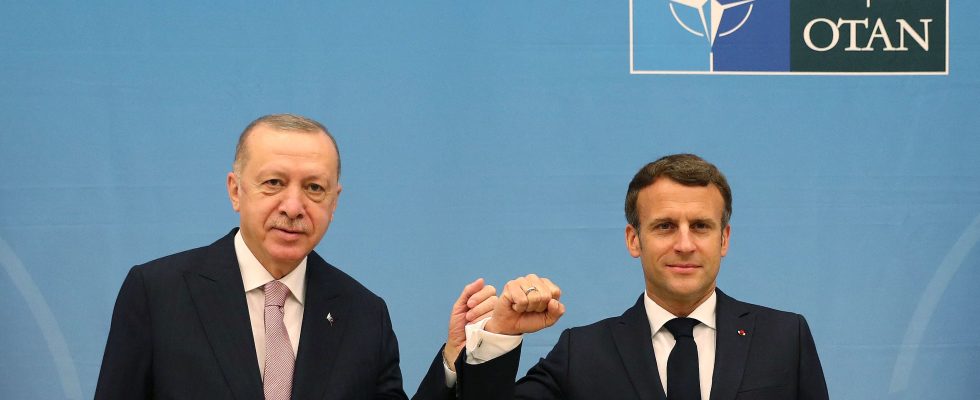These two won’t be vacationing together, but their wives might. In Prague, at the first summit of the European Political Community in early October 2022, the usually taciturn Recep Tayyip Erdogan has an easy joke. At the turn of a conversation between heads of state, the Turkish president lets go about Emmanuel Macron: “Our wives get along well, not us!” The verdict, undiplomatic, has the merit of frankness.
Since 2017, the two heads of state love to hate each other. Their relationship is punctuated by outbursts, insults and demonstrations of force. “In recent years, summarizes a French diplomat, Turkey has gone on an adventure on multiple fronts, which has blurred its position and its commitment on important issues for France, the European Union and NATO.” Paris shares a specific defense agreement with Greece, victim of repeated threats of invasion by Erdogan, defends Armenia against attacks from Azerbaijan, supported by Turkey, and wants to protect the Kurds in the east of Turkey. So, between the two strong men of Paris and Ankara, tempers tend to heat up.
The exchange of arms between the two leaders began in 2018 on the subject of… yellow vests. Erdogan had taken advantage of the social crisis in France to attack those who criticized Turkey’s authoritarian drift. THE stay It was then easy to denounce “the disproportionate violence” of the French police against the demonstrators. Then the year 2020 was undoubtedly the hottest between the two presidents: after attributing “the brain death of NATO” to Turkish actions in Syria, Macron had made Turkey bear “historical and criminal responsibility” in the conflict in Libya, because of its military presence there. France then deployed its warships and fighter jets to the eastern Mediterranean to respond to Turkish provocations against Greece.
“I hope France will get rid of the Macron problem”
The conflict then took a very personal turn, at the end of 2020, when Erdogan urged Macron to “get treatment” for “mental health” problems: the French president had the misfortune to reaffirm the right to caricature the Prophet Muhammad after the assassination of Samuel Paty… “I hope that France will get rid of the Macron problem as soon as possible”, had ended up warning the Turkish president. “Several times, France and Turkey have found themselves hostages of their heads of state and their relationship, regrets Ibrahim Kaboglu, Turkish opposition deputy (CHP) and great Francophile. Their mutual faults are reflected at the international level: when Macron speaks, Turkey only hears Islamophobia; when Erdogan makes a speech about France, you will automatically be suspicious… Prejudices cause reciprocal ignorance.”
Before the May 14 election, French diplomacy can only hope for an appeasement, or at least a clarification of Turkey’s role on the international scene. If Erdogan is defeated, Macron is unlikely to regret their relationship. “If a new team comes to power in Turkey, it will not need to make an anti-France speech, believes Bayram Balci, former director of the French Institute for Anatolian Studies. Erdogan did it because this fight against France helped him domestically.”
Nevertheless, even if he masters a few words of French (the only foreign language in his repertoire), the opposition candidate Kemal Kiliçdaroglu will not become the best friend of the Elysée in the event of victory. “Antagonisms will remain, even if Erdogan loses, points out Bayram Balci. France will always see Turkey as a country that is too interested in Africa. Similarly, Paris will remain pro-Armenia for eternity… Tensions will persist , but they will be less verbal and less personal.”
On June 1, Emmanuel Macron will shake hands with the Turkish president again, during the summit of the European Political Community in Moldova. It remains to be seen whether this hand will be that of his best enemy, Recep Tayyip Erdogan.
